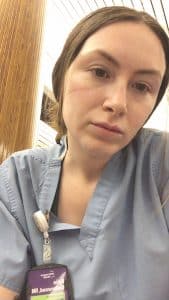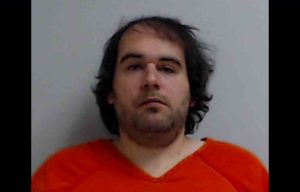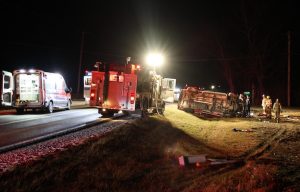Columbia nurse answers the call

on her face following a 12-hour
nursing shift wearing an N-95 mask.
A Columbia woman recently returned from a trip to New York City.
This was not a pleasure trip for Kylie Underwood. She spent about a month working as a nurse at the epicenter of America’s coronavirus outbreak.
“I just felt pulled, like something greater was telling me to go out there and help,” Underwood said.
Underwood, who graduated from the University of Missouri-St. Louis about four years ago, normally works as a staff nurse at Christian Northwest Emergency Department in Florissant, Mo.
When the pandemic first hit America’s most populous city, Underwood saw news reports and social media posts of fellow nurses volunteering to travel and help the city.
“I thought about it, but I thought it was kind of crazy to go out there and just drop everything and leave,” Underwood said. “Then one day as I was leaving work I was like ‘nope, I’m going to go do it.’”
She talked with her managers and told them she felt compelled to help, temporarily shifting from a full-time nurse to an as-needed nurse to do so.
She signed up and the next day had her assignment to go to NYU Langone Hospital in Brooklyn.
She was scheduled to fly to New York, but all the flights to the city were canceled so she rented a car and drove halfway across the country.
The health care professionals in New York appreciated the reinforcements of people like Underwood.
“They were really thankful and appreciative that everyone came to help,” Underwood said. “The first day when we were in orientation, some of the managers were just in tears. They were exhausted because they were working every day of the week at all hours of the day.”
The city expressed its gratitude, too, as one day local firefighters played bagpipes outside the hospital to salute all health care workers.
Underwood worked at the hospital in the emergency room from April 15 to May 9.
She worked the night shift, so she would get up about 4:30 or 5 p.m. and take an Uber to the hospital.
She would change into her scrubs, start her shift with a meeting that would include assigning her to one of three areas of the emergency department. There was the COVID-19 side, step-down ICU area or section for less critical patients.
“You just worked for 12 hours and did the nursing,” Underwood said. “Nursing is nursing, no matter where you’re at.”
Underwood worked four days a week, caring mainly for people with COVID-19.
“When I first got there, it was mostly corona patients who were coming in,” she recounted. “Toward the end of the assignment, some of the regular traffic started to pick up as things started to ease.”
Underwood said many of the patients did not have symptoms of the virus, but they had heart attacks and strokes caused by the microclots coronavirus causes. The hospital also saw a spike in suicide attempts as people reeled from the pandemic.
About 99 percent of people who came to the hospital for COVID-19 were hospitalized, Underwood said, and required “very intense care.”
“A lot of the ones were already in distress when they were coming to the ER,” she explained. “And you try not to intubate quickly on these patients because they’re not tolerating the intubation well. They’re unable to come off the breathing machine. So we try as much as we can before intubation.”
Underwood said it was a “high-stress” environment to work in since she was a traveler who did not know the facility or people well, but all employees and fellow travelers were nice and helpful.
“It was just stressful because you’re dealing with something that you don’t know much about,” she added. “We know some things about the virus, but we don’t know the long-term effects of this.”
After flying back home, Underwood will remain in self-isolation for two weeks to ensure she does not have the virus before returning to her normal job in June. She has experienced no symptoms thus far.
She said the experience of seeing how another hospital system in another part of the country runs was “eye-opening,” as was seeing the pandemic response in another area.
“Seeing the people there, and not just the nurses but the general public, and how they feel about it is so different than here,” Underwood said. “They are taking it very seriously. The streets are empty.”
“Obviously, the country does have to get back to what we call normal, but we have to do it safely and cautiously and just be careful,” she continued. “That’s what I keep telling everyone: be smart, be safe, wear a mask, wash your hands and stay that six feet apart.”






